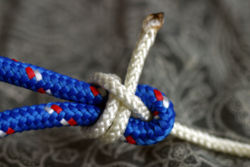m |
|||
| (29 intermediate revisions by 4 users not shown) | |||
| Line 1: | Line 1: | ||
| − | + | <noinclude><translate><!--T:2--> | |
| − | + | </noinclude> | |
| − | + | {{Knot | |
| − | + | | name=Double sheet bend | |
| − | + | | image= Double sheet bend.jpg | |
| − | + | | use= | |
| − | + | The '''double sheet bend''' or '''double becket bend''' is a strong knot used to tie two ropes (usually of different thicknesses or rigidity) together. It is a doubled version of the sheet bend. | |
| − | + | |tying_instructions = | |
| − | + | To tie the double sheet bend, start by making a bight in the larger line. Pass the working end of the smaller line up through the bight, around behind the bight, and beneath the loop in the smaller line (that's a sheet bend). Then once again, pass the working end along the same path, around behind the bight and beneath the loop in the smaller line. | |
| + | |warnings=As with the standard sheet bend, the two free ends should end up on the same side of the knot. If they do not, a ''left-handed double sheet bend'' results, which is much weaker. | ||
| + | }} | ||
| + | <noinclude></translate></noinclude> | ||
Latest revision as of 04:07, 15 July 2022
| Double sheet bend |
|---|
|
Use: The double sheet bend or double becket bend is a strong knot used to tie two ropes (usually of different thicknesses or rigidity) together. It is a doubled version of the sheet bend.
How to tie:
WARNING: As with the standard sheet bend, the two free ends should end up on the same side of the knot. If they do not, a left-handed double sheet bend results, which is much weaker.
|

